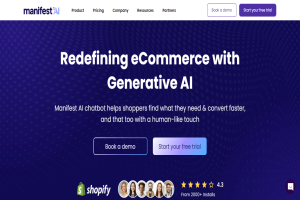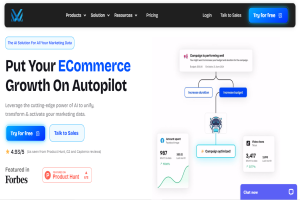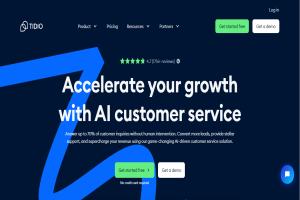Tool List
Top AI Tools for Ecommerce
AI tools for eCommerce revolutionize online retail by personalizing customer experiences, optimizing pricing, and improving inventory management. These tools can analyze customer behaviour, recommend products, and automate marketing campaigns, leading to higher conversions and customer satisfaction. Costs for AI eCommerce tools vary, with some offering free versions or pay-as-you-go pricing while others charge monthly subscriptions from $50 to $500 or more. AI in eCommerce is essential as it enhances customer engagement, increases sales, and streamlines operations, making it a key driver of success for online retailers in today's competitive market.

Getmanifest
Manifest AI chatbot helps shoppers find what they need & convert faster, and that too with a human-like touch

Mokker
Professional product photos, instantly. From a single product image.

Copy Genius
Use Artificial Intelligence to automatically write ad copy, product descriptions, and more!

Rocketfy
To increase your sales on Etsy, analyze your listings and get smart recommendations with Roketfy technologies.

Markopolo
Leverage the cutting-edge power of AI to unify, transform & activate your marketing data.

Tidio
Answer up to 70% of customer inquiries without human intervention. Convert more leads, provide stellar support, and supe...

Wordlab
Escape the hefty costs and long waits of professional studio shoots; or if you’re DIY-ing, say goodbye to editing strugg...

Certainly
Take advantage of our tailormade AI chatbot platform to enhance your CX, resolve support tickets and scale your support...

Kua
Refurbish your website so you have a much higher conversion rate Build 10 high quality listing to boost your Amazon s...
Frequently Asked Questions
AI tools for eCommerce are software applications that use artificial intelligence to optimize online retail operations, including customer service, inventory management, personalized shopping experiences, and more.
AI can automate customer service through chatbots that handle inquiries and complaints, provide product recommendations, and support customers through their shopping journey, reducing wait times and increasing satisfaction.
Yes, AI tools analyze customer data such as past purchases, browsing behavior, and preferences to provide personalized product recommendations and targeted marketing, enhancing the customer experience and increasing sales.
AI tools can predict demand based on various factors like trends, seasonality, and consumer behavior, helping businesses optimize inventory levels and reduce overstock or stockouts.
AI algorithms analyze market conditions, competitor pricing, and consumer demand to dynamically adjust prices in real-time, maximizing profits and competitiveness.
Yes, AI can identify patterns and anomalies in transaction data that may indicate fraudulent activity, helping to prevent losses and protect both the business and its customers.
AI tools can automate and optimize marketing campaigns, segment customers for targeted outreach, create content, and manage ads, ensuring higher ROI on marketing spend.
AI improves search functionality by understanding natural language queries, providing relevant search results, and personalizing the search experience based on user behavior.
AI can analyze user engagement and behavior to optimize website layout, improve navigation paths, and make product discovery easier and more intuitive.
AI tools analyze data including customer demographics, transaction records, website interaction metrics, social media feedback, and more to inform various aspects of eCommerce management.
AI applications can optimize delivery routes, manage warehouse operations, and predict optimal stock levels at different locations to improve efficiency and reduce costs.
Some AI tools can assist in website design by suggesting layouts, color schemes, and content placement based on best practices and user engagement analytics.
Challenges include integrating AI with existing systems, ensuring data privacy and security, managing data quality, and the need for ongoing training of AI models to adapt to new trends.
AI can automate the processing of returns and refunds by analyzing the reasons for returns, managing logistics, and updating inventory, while also identifying trends to reduce future returns.
The future of AI in eCommerce includes more advanced personalization engines, increased automation of complex processes, improved customer interaction through virtual reality, and the integration of AI with emerging technologies like blockchain for enhanced security and transparency.
Frequently Asked Questions
Q: What are AI tools for eCommerce?
A: AI tools for eCommerce are software applications that use artificial intelligence to optimize online retail operations, including customer service, inventory management, personalized shopping experiences, and more.
Q: How can AI tools improve customer service in eCommerce?
A: AI can automate customer service through chatbots that handle inquiries and complaints, provide product recommendations, and support customers through their shopping journey, reducing wait times and increasing satisfaction.
Q: Can AI tools help personalize the shopping experience?
A: Yes, AI tools analyze customer data such as past purchases, browsing behavior, and preferences to provide personalized product recommendations and targeted marketing, enhancing the customer experience and increasing sales.
Q: What is the role of AI in managing eCommerce inventory?
A: AI tools can predict demand based on various factors like trends, seasonality, and consumer behavior, helping businesses optimize inventory levels and reduce overstock or stockouts.
Q: How do AI tools optimize pricing strategies in eCommerce?
A: AI algorithms analyze market conditions, competitor pricing, and consumer demand to dynamically adjust prices in real-time, maximizing profits and competitiveness.
Q: Can AI tools detect fraudulent transactions in eCommerce?
A: Yes, AI can identify patterns and anomalies in transaction data that may indicate fraudulent activity, helping to prevent losses and protect both the business and its customers.
Q: Are AI tools used for marketing in eCommerce?
A: AI tools can automate and optimize marketing campaigns, segment customers for targeted outreach, create content, and manage ads, ensuring higher ROI on marketing spend.
Q: How do AI tools enhance website search functionality?
A: AI improves search functionality by understanding natural language queries, providing relevant search results, and personalizing the search experience based on user behavior.
Q: Can AI tools improve website navigation?
A: AI can analyze user engagement and behavior to optimize website layout, improve navigation paths, and make product discovery easier and more intuitive.
Q: What types of data do AI eCommerce tools analyze?
A: AI tools analyze data including customer demographics, transaction records, website interaction metrics, social media feedback, and more to inform various aspects of eCommerce management.
Q: How can AI tools help with eCommerce logistics?
A: AI applications can optimize delivery routes, manage warehouse operations, and predict optimal stock levels at different locations to improve efficiency and reduce costs.
Q: Can AI tools design eCommerce websites?
A: Some AI tools can assist in website design by suggesting layouts, color schemes, and content placement based on best practices and user engagement analytics.
Q: What are the challenges of implementing AI in eCommerce?
A: Challenges include integrating AI with existing systems, ensuring data privacy and security, managing data quality, and the need for ongoing training of AI models to adapt to new trends.
Q: How does AI handle returns and refunds in eCommerce?
A: AI can automate the processing of returns and refunds by analyzing the reasons for returns, managing logistics, and updating inventory, while also identifying trends to reduce future returns.
Q: What is the future of AI in eCommerce?
A: The future of AI in eCommerce includes more advanced personalization engines, increased automation of complex processes, improved customer interaction through virtual reality, and the integration of AI with emerging technologies like blockchain for enhanced security and transparency.
Frequently Asked Questions
Q: What are AI tools for eCommerce?
A: AI tools for eCommerce are software applications that use artificial intelligence to optimize online retail operations, including customer service, inventory management, personalized shopping experiences, and more.
Q: How can AI tools improve customer service in eCommerce?
A: AI can automate customer service through chatbots that handle inquiries and complaints, provide product recommendations, and support customers through their shopping journey, reducing wait times and increasing satisfaction.
Q: Can AI tools help personalize the shopping experience?
A: Yes, AI tools analyze customer data such as past purchases, browsing behavior, and preferences to provide personalized product recommendations and targeted marketing, enhancing the customer experience and increasing sales.
Q: What is the role of AI in managing eCommerce inventory?
A: AI tools can predict demand based on various factors like trends, seasonality, and consumer behavior, helping businesses optimize inventory levels and reduce overstock or stockouts.
Q: How do AI tools optimize pricing strategies in eCommerce?
A: AI algorithms analyze market conditions, competitor pricing, and consumer demand to dynamically adjust prices in real-time, maximizing profits and competitiveness.
Q: Can AI tools detect fraudulent transactions in eCommerce?
A: Yes, AI can identify patterns and anomalies in transaction data that may indicate fraudulent activity, helping to prevent losses and protect both the business and its customers.
Q: Are AI tools used for marketing in eCommerce?
A: AI tools can automate and optimize marketing campaigns, segment customers for targeted outreach, create content, and manage ads, ensuring higher ROI on marketing spend.
Q: How do AI tools enhance website search functionality?
A: AI improves search functionality by understanding natural language queries, providing relevant search results, and personalizing the search experience based on user behavior.
Q: Can AI tools improve website navigation?
A: AI can analyze user engagement and behavior to optimize website layout, improve navigation paths, and make product discovery easier and more intuitive.
Q: What types of data do AI eCommerce tools analyze?
A: AI tools analyze data including customer demographics, transaction records, website interaction metrics, social media feedback, and more to inform various aspects of eCommerce management.
Q: How can AI tools help with eCommerce logistics?
A: AI applications can optimize delivery routes, manage warehouse operations, and predict optimal stock levels at different locations to improve efficiency and reduce costs.
Q: Can AI tools design eCommerce websites?
A: Some AI tools can assist in website design by suggesting layouts, color schemes, and content placement based on best practices and user engagement analytics.
Q: What are the challenges of implementing AI in eCommerce?
A: Challenges include integrating AI with existing systems, ensuring data privacy and security, managing data quality, and the need for ongoing training of AI models to adapt to new trends.
Q: How does AI handle returns and refunds in eCommerce?
A: AI can automate the processing of returns and refunds by analyzing the reasons for returns, managing logistics, and updating inventory, while also identifying trends to reduce future returns.
Q: What is the future of AI in eCommerce?
A: The future of AI in eCommerce includes more advanced personalization engines, increased automation of complex processes, improved customer interaction through virtual reality, and the integration of AI with emerging technologies like blockchain for enhanced security and transparency.

